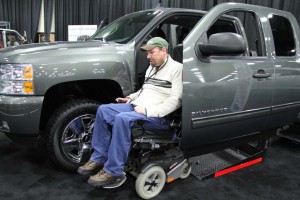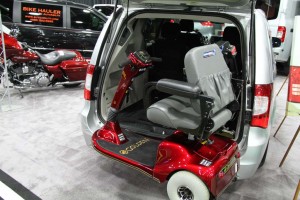
Steve Armstrong, co-founder of GoShichi, rolls into one of the company's modified Chevy Silverado pickups.
At first glance, the MV-1 looks like an oversized version of the Checker cabs that once were commonplace on urban streets. But the vehicle, designed and built by Florida’s Vehicle Production Group has a very different passenger in mind.
The MV-1 is the first vehicle specifically developed for the disabled. That might seem like a small niche but, in fact, there are millions of Americans who cannot get into, never mind operate, a conventional automobile without assistance.
The good news is that the MV-1 is part of a growing movement to help the handicapped improve their mobility. The problem is that the alternatives can be extremely costly at a time when there are fewer sources of help – especially from cash-strapped local, state and federal government agencies.
According to federal data, there are 54 million Americans with some form of disability. Of those, 14 million require some assistance to remain mobile, while 4 million are confined to a wheelchair or similar device.
That includes Steve Kitchen who was left a quadriplegic when the car he was riding in had a severe collision in 1999. He has since been severely restricted in his mobility, moving around only with the help of an electric wheelchair.
Working with an engineer friend, Kitchen helped design a modification for the big Chevrolet Silverado pickup – which can also be used for the similar GMC Sierra. It opens the passenger compartment up, almost like a drawer, a ramp descending to allow the wheelchair-bound to roll up and inside. With the addition of modified hand controls Kitchen can now drive himself around without assistance.
His Ft. Wayne, Indiana-based, GoShichi, is one of a half-dozen companies dealing with the handicap to display its wares at this year’s Detroit Auto Show. GoShichi has already sold about 150 of the modified pickups and is now ramping up production. Its goal is to reach a monthly output of 150.
The most popular conversions involve minivans, and AutoAbility, another firm displaying its wares at Detroit’s Cobo Hall, modifies a wide line-up of people-movers, including Chrysler, Toyota and Volkswagen products.
“The demographics in the country suggest there’s a lot of growth in the market,” says Chuck Fortinberry, President and CEO of AutoAbility, in Clarkston, Michigan. With the huge Baby Boom generation now reaching retirement age, that suggests the number of Americans needing wheelchairs “will grow exponentially” over the next 25 years, he suggests.
AutoAbility takes a conventional minivan, modifies the suspension, exhaust system, and floor, then adds a ramp to allow easy, roll-in access. In also has a system that allows a person with limited, rather than the complete loss of, mobility, to transfer into the driver’s seat.
Indeed, experts note there are any number of ways in which mobility can be limited, slightly or severely, and suburban Detroit’s Creative Mobility Group has made a business of customizing solutions depending on a client’s needs.
For one patient undergoing physical therapy they installed removable pegs on the driver’s side to allow her to climb into the seat. “In some cases,” she explains, people just need a little help getting in or out of the vehicle,” notes Margo Vranic, the firm’s regional sales manager.
One of Creative Mobility’s more popular products is a pedal extender that can help a person who might have a leg shortened by a birth defect or accident – or those who are simply too short to comfortably reach the pedals.
The cost of regaining mobility can vary widely – from a few hundred dollars for simple devices like pedal extenders to more than $20,000 for a van or truck modification, such as the one AutoMobility and GoShichi offer. The MV-1, the only vehicle currently designed specifically for use by those with limited mobility starts at $39,950. A conversion to permit running on clean compressed natural gas costs an extra $9,000.
Those are significant numbers, and while an accident victim, like GoShichi’s Kitchen might be able to recover some of the costs, most people who are mobility-challenged have to tap their own resources. The expenses are general not covered by disability, Medicare or Social Security.
A number of automakers, including General Motors, Chrysler, Ford, Volkswagen, Honda and Toyota have set up a mobility rebate program that will cover up to $1,000 for modifications for those who purchase a new vehicle.
Toyota is the only maker to specifically offer a factory-installed mobility system. The Auto Access Seat was, “Designed for someone who has some mobility but difficulty getting in and out of a vehicle,” explains Toyota representative Quaid McIver, it functions like a regular car seat but swings forward and out the door to make for simple ingress and egress.
For those mobility challenged, there are now more options than ever – but without a healthy bank account, they may be out of reach.

